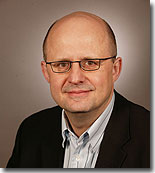REDMOND, Wash. – July 7, 2010 – Every spring professor Keith Kelly watches students graduate from the Computer Information Technology program at Northwestern Michigan College and make their way into the work force. The college is a participant in the Microsoft IT Academy, a membership-based organization that offers IT training and resources to schools. This year, Kelly is hopeful that even in his state’s depressed economy, his students have a shot at finding employment in IT and software development — two of the few fields that are actually growing. But he fears a college-issued degree alone isn’t necessarily enough to land a job. “I think employers really want to see both degrees and industry certifications,” says Kelly.

Until now, there haven’t been enough certification programs that focus on fundamental IT and development skills, says Kelly. He’s hopeful that the new Microsoft Technology Associate (MTA) will fill this void.
Launched today, the MTA will offer students a certification in the fundamentals of IT and development. Unlike more advanced Microsoft certifications, the MTA targets students with no prior IT or development experience or employment. It is available exclusively in educational settings and is designed to easily integrate into the curricula of existing computer classes.
The MTA offers three IT certifications, three development certifications and one database certification. The IT section includes tests in Networking Fundamentals, Security Fundamentals and Windows Server Administration Fundamentals. The development certification offers tests in Software Development Fundamentals, Windows Development Fundamentals and Web Development Fundamentals. The database certification covers Database Administration Fundamentals. Students can pursue as many or as few certifications as they choose.
Participating teachers can continue to use their favorite courseware to teach fundamental technology concepts, and also use the included MTA Certification Exam Review Kits (ERKs) to complement existing textbooks. For each exam, 20 hours of instructional material is available. The MTA will eventually be available in thousands of high schools, vocational programs and colleges in the U.S. and other countries. Some colleges are considering making the MTA a mandatory part of their freshman curricula in IT and development. Testing will be conducted by Certiport, a commercial testing service, at participating schools.

Lutz Ziob, general manager of Microsoft Learning.
In addition to giving students a basic certification, MTA is designed to be a stepping stone to other, more sophisticated Microsoft technology certifications, like the Microsoft Certified Technology Specialist (MCTS). The MTCS certifications, which are available for a wide range of Microsoft products and solutions, provide evidence of technology knowledge and skills in design, implementation and troubleshooting. MCTS is designed for people who already have work experience or are pursing advanced degrees in computer information technology.
Northwestern Michigan student Russ McGinely is hoping to study for the exam and earn the MTA certification. McGinely is graduating this year with an associate’s degree in computer information technology. He’s starting an internship soon, but doesn’t have permanent employment lined up for the future. McGinely believes that having an MTA certification on his resume along with his degree would make him a more appealing candidate to potential employers. “Every company I’ve interviewed with asks me if I’ve considered getting a certification,” he says.
Lutz Ziob, general manager of Microsoft Learning, says one of the goals of MTA is to expose students to many different potential career paths and specialties. “If you’re a beginning student, you may not know what you’d like to specialize in,” Ziob says. “The MTA exams and curricula give students a good overview of the world of IT and development.”
Microsoft is introducing MTA at the Microsoft Education Leaders Forum in Warsaw this week. The forum is an annual event at which European education experts and policy-makers gather to discuss innovation and technology in the classroom.
Microsoft also announced that students at some universities in Ireland and the U.S. can get college credit for Microsoft certifications. In Ireland, some certifications were approved for college credit by the Higher Education and Training Awards Council. This is the first time that a European educational organization has approved industry certifications for college credit. In the U.S., Microsoft received a similar accreditation from the American Council on Education for Microsoft certifications.




